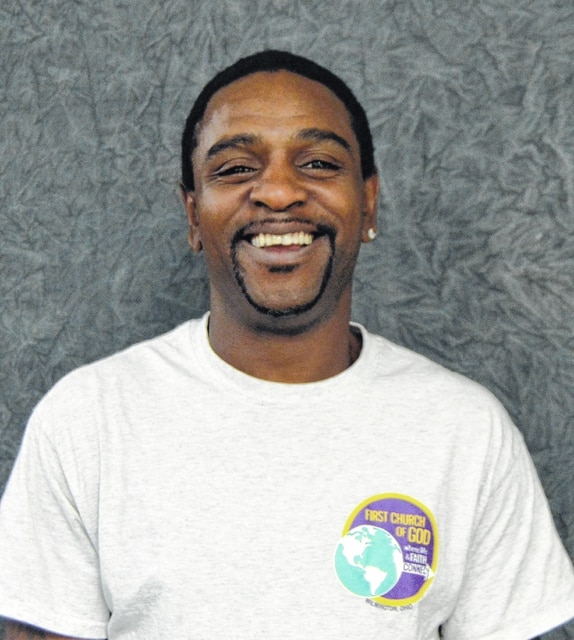
WILMINGTON — After more than two decades of drug use and more than a year meeting regularly with probation officers and a judge, David Key can finally say he’s drug-free.
Key, now 40, was the first person to enroll in the You-Turn Recovery Docket, a court program that includes probation officers, treatment providers and Clinton County Common Pleas Judge John W. “Tim” Rudduck. The program ultimately diverts offenders from prison with the goals of treating their underlying addictions.
Key will also be the first drug court graduate on Friday. He’s nervous and doesn’t know what he’ll say, but he’s also proud to be part of something bigger than him.
Key began using drugs when he was 15 or 16 years old, when he left home for the Cincinnati area to join a Job Corps program there.
He said he lived a sheltered life before, and when he moved he wanted to be one of the cool kids. He also found that he enjoyed being drunk or high.
“When I had a chance to experience the world like it really is, I dove in head first,” Key said. “And that just led to one bad choice after another. … The drugs and the alcohol crept in there, and before I realized it, it was something that stopped being fun and started being necessary.”
Over time, he went from smoking marijuana and drinking alcohol to experimenting with cocaine, LSD and, eventually, heroin, to which he later became addicted.
“With heroin, it’s not the drug or the high itself” Key said. “It’s the fact that you’re body becomes so dependent on it, if you don’t have it, you become physically sick. It is the worst feeling in the world.
“You will almost do anything to get the money or to do what you have to do to get that drug so you’re not feeling sick,” Key continued.
Key got sober once, a time when “life was good,” but it didn’t last.
“And then I stopped doing things that I knew how to do to maintain that sobriety and everything went down the tubes. … And the shame and the guilt of that kept me there for a long time.”
Key said he was eaten up with guilt and didn’t know where to turn.
“Even though you know this ain’t right, you still keep doing it,” Key said. “That’s how powerful addiction is. That’s the insanity it causes. … It just takes you over.”
It all caught up to him in 2012, when he was arrested for a fifth-degree felony offense of trafficking in heroin. He was sentenced to two years of community control in 2013.
After a couple of probation violations, Rudduck said he could sentence Key to the final 28 days left in his sentence and then Key would have been scot-free.
Instead, Key became the first applicant to the drug court.
“It was an earnest desire to change,” Rudduck said. “This program gave him a vehicle to transform his life, and he knew we were going to hold him accountable.”
Key said he had resigned himself to going to prison and repeating the cycle when a shred of conscience he had left kicked in. And he knew himself well enough to know that he needed help.
“I needed somebody to hold me accountable, or I would just recycle myself through the system,” Key said.
While in drug court, Key took Vivitrol, a locally-made medication that blocks opioid receptors in the brain. In short, it doesn’t allow a person to get high from abusing opioids, like heroin.
“That gave me a good handle on living without heroin,” Key said.
Key then learned a set of principles and found a spiritual community where he was mentored.
“They’re the ones that open the door to me to take advantage of those tools and hook up with people who can help me with (those beliefs and sobriety) and share similar experiences,” Key said.
Key admits it was a gradual process. Rudduck said within a week of being on drug court, Key tested positive for heroin use and Rudduck jailed him for a few days.
A couple of weeks later, Key tested positive for marijuana use, and Rudduck ordered him to complete 40 hours of community service.
About a month after that, Key told Rudduck he drank a beer, which is a violation of the program’s policies.
“Since that time he told me he had a beer, we’ve not had one problem with David,” Rudduck said. “That’s how you make progress – learning from mistakes.”
In addition to accountability, Vivitrol and a community of like-minded believers, Key credited the treatment team and its different perspectives with his success.
He thinks those different perspectives benefitted his recovery by helping him know someone cared about his recovery.
“I’ve still got a long way to go,” Key admits. “The real test is going to be continuing this way of life even without” the drug court.
“At this point today, I know that I’m still on the right path,” Key continued. “Life is still going to happen to me, but I can’t give up at the first sign of trouble.”
Today, he says, he knows he’s not using. Today, he knows he has friends and a community to lean on, tools to use, lessons to learn and a higher power to guide him.
Reach Nathan Kraatz at 937-382-2574, ext. 2510 or on Twitter @NathanKraatz.


